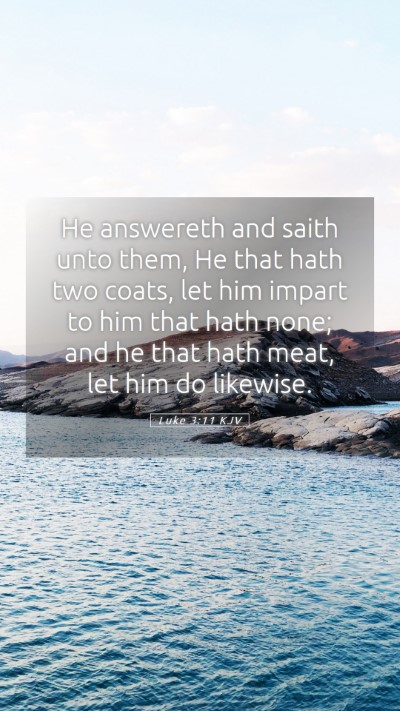Bible Verse Commentary: Luke 3:11
Verse: "He answered and said to them, 'He who has two tunics, let him give to him who has none; and he who has food, let him do likewise.'" (Luke 3:11, NKJV)
Understanding Luke 3:11
This verse is situated within the context of John the Baptist's ministry, where he teaches the people about repentance and the fruits of a righteous life. Luke 3:11 offers significant insight into the morality and ethical responsibility of individuals within the community.
- Call to Generosity: According to Matthew Henry's commentary, this passage highlights the moral obligation of those who have excess to share with those in need. It reflects the principle of love and charity that is deeply rooted in Christian teaching.
- Response to Questions of Righteousness: Albert Barnes emphasizes that John the Baptist's response to the inquiries regarding righteousness serves as a direct call for tangible action. The call to share one's resources indicates a radical shift from selfishness to selflessness.
- Practical Application of Faith: Adam Clarke points out that this verse provides a practical application of faith. It is not enough to profess love; one must demonstrate it through actions, particularly by caring for the poor and needy.
Biblical Exegesis of Luke 3:11
The context surrounding Luke 3:11 is pivotal for understanding its meaning. John the Baptist is addressing crowds who come to him for baptism. He uses this moment to teach about ethical living and social responsibility. The instruction to donate excess clothing and food illustrates the early Christian values centered on community support and active compassion.
Historical and Social Context
During the time of John the Baptist, societal conditions often led to significant disparity between the wealthy and the poor. In this context, the call to share and support one another was revolutionary. As Albert Barnes mentions, it aligns with the overall message of the Gospel, which emphasizes caring for others as a reflection of one's faith.
Interpretation Through Scripture Analysis
In examining Luke 3:11, we see the emphasis on action and moral duty in Christian teaching. This connects to various scriptural principles:
- The importance of loving one’s neighbor as oneself (Mark 12:31).
- The teaching of Jesus on caring for the least of these (Matthew 25:40).
- The early church's practice of sharing resources (Acts 2:44-45).
Application of Luke 3:11 in Daily Life
This verse encourages individuals to actively seek opportunities to serve others within their community. Sharing what we have is a concrete way to express our faith and a testament to the transformative nature of encountering the Gospel.
Impact on Personal Conduct
Understanding this verse helps believers grasp the implications of their faith in everyday life. It invites reflection on how one can contribute positively to society, supporting those who are less fortunate, and fostering a spirit of generosity.
Connection with Other Scripture
Luke 3:11 correlates with various biblical teachings on generosity and community support:
- 1 John 3:17: “But whoever has this world’s goods, and sees his brother in need, and shuts up his heart from him, how does the love of God abide in him?”
- Proverbs 19:17: “He who has pity on the poor lends to the LORD, and He will pay back what he has given.”
- Galatians 6:2: “Bear one another's burdens, and so fulfill the law of Christ.”
Conclusion
In summary, Luke 3:11 serves as a poignant reminder of the Christian call to act with compassion and generosity. The teachings of John the Baptist resonate throughout the New Testament and encourage believers to embody the love of Christ in practical ways. By understanding and applying this scripture, individuals can contribute to a more equitable and loving community.
For those engaged in Bible study groups or exploring online Bible study, Luke 3:11 presents a rich opportunity for Bible study insights and discussions on practical faith.


